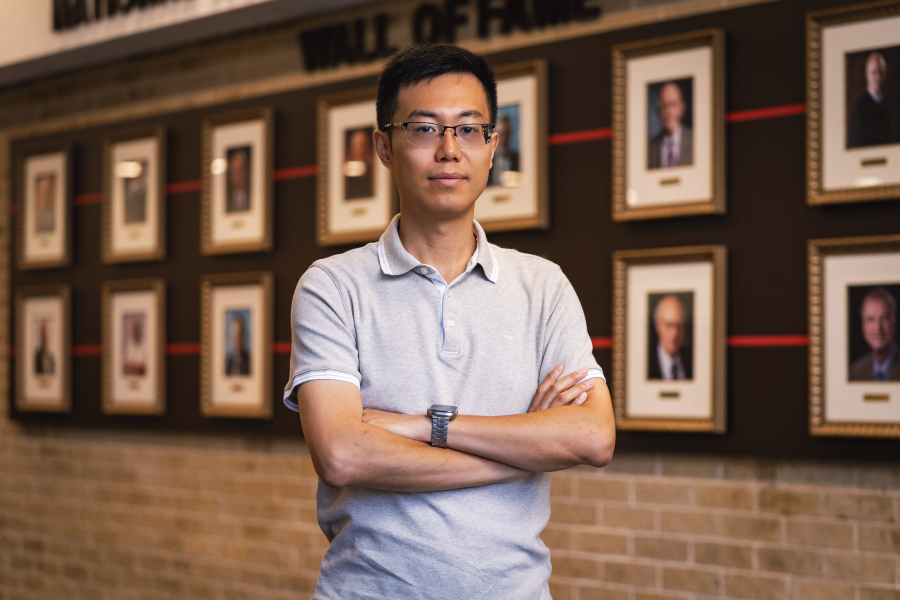Associate Professor of Mechanical Engineering Technology Zheng Fan has been awarded $549,771 for his CAREER Award proposal, Understanding the Formation of Pore-Free Interlayers through Automated in situ Diagnosis to Tame Lithium Metal.
This project will investigate a new composite material, a metal-carbon mixed ionic-electronic conductor (c-MIEC), as a solution for overcoming interface issues common to current iterations of high storage density solid-state lithium metal batteries. Enhancing the performance and scalability of solid-state lithium metal batteries to improve range and performance will be crucial in the broader implementation of next-generation electric vehicles.
Fan describes himself as a materials scientist with a major focus on battery study and development, but this project goes far beyond the development of new battery technologies.
“My proposal is also for a new research framework in materials science — not just for battery design or chemistry,” said Fan. “I’m going to integrate automatic experimentation, including sample fabrication and characterization, connected with AI analysis like machine learning algorithms to optimize the systems we select and use.”
“We want to transform conventional material research and experiments — involving lots of manual labor and tools, making them slow and possibly involving human errors — and transform this process to an automatic, fast, data-rich and AI-guided research process,” he added.
Most cutting-edge experimental research tools still require manual human operation. Fan seeks to integrate these tools into a scalable, closed loop of automatic operation and AI-driven data analysis that will reduce human effort and error while increasing the rate of successful discovery.
“In battery science, there will always be a lot of specimens to test different properties — chemical properties, structural properties, mechanical properties — and every property should be one [individual] sample, but that takes a lot of time.”
In fact, he estimates that a manually-derived battery sample by a student takes about two hours.
Fan studied mechanical design as an undergraduate and focused on robotics during his master's degree, only settling into nano and micro materials while pursuing his PhD. This path, he believes, allows him to bring a unique perspective to his research.
“I think, due to my background… I have a broader approach in thinking about the whole process of the experiment. I can also see a bottleneck in the current pursuit of scientific discovery: although nowadays we have many experimental tools like the high-resolution microscope, the spectroscope, the x-ray, we scientists still have to operate them by ourselves.
“But if we have this automated lab assistant, we can break this limitation. Humans have to take a rest, have to eat, but the robot will not — and it will not involve errors,” he added.
Fan expects the standardized automation of this research process to reduce battery fabrication time and allow it to run continuously, taking data collection “to a new level” while leaving researchers more time for critical thinking.
“Automation is no longer a luxury. This work will redefine the capabilities of small research groups. By creating an automated experimentation framework, we empower more researchers to tackle grand scientific challenges,” he said.
Fan will also develop a related virtual lab wherein selected interested students will have the opportunity to participate in research.
“Decentralization is the key to this project, not only in the research plan, but also for the education. We are going to find future researchers and engineers. Conventionally, we would just invite certain schools or certain districts, but my principle is to decentralize the approach. Any student interested in my research will be invited, and in my proposal, this decentralization is essential. I want to break the conventional resource concentration patterns for research and education and make them accessible to everyone, so that everyone has a chance to be involved,” said Fan.
“My hope is that we will develop a global benchmark in new patterns for data and new framework for materials science research — a single-PI laboratory with a closed loop and automatic experimentations that can be adopted in other industries.
“I believe this research will be a cultural shift,” he added. “Right now, people may be afraid of more automation — they are afraid of whether they can let their life depend on a machine — but I think we should embrace it. It will be the future for automations to change not only our daily lives, but our scientific research.”
Project funding is expected to run through May 2030.
